Search
Showing 10 of 1867 results for how to register international groups
-
New Zealand to be Country of Honour at the China Annual Conference and Expo for International Education (CACIE) 2025
ENZ Chief Executive Amanda Malu was recently in Beijing attending the China Annual Conference and Expo for International Education (CACIE). There, as part of the announcement, Amanda gave a keynote speech at the CACIE Night gala dinner and highlighted the broad and important education links between New Zealand and China. New Zealand was previously Country of Honour at CACIE in 2015.
CACIE is the largest annual international education event for businesses and students in China. Over 20,000 visitors attended the expo, with an estimated 5,000 people in the audience at the opening plenary.
There are ample opportunities to showcase New Zealand at 2025 CACIE and leverage our COH status to raise awareness of New Zealand through a strong in-person presence, New Zealand-focused events, cultural performances and media engagements.
The ENZ team will work through peak bodies on feedback and input from the sector on the New Zealand presence and events at CACIE.
In the meantime, keep an eye on the CACIE website where the 2025 dates and conference theme will be announced soon, or reach out to your ENZ Business Development Manager if you have any questions or ideas to share.
Highlights from New Zealand’s presence at this year’s conference

Amanda met with LIU Limen, President of the China Education Association for International Exchange (CEAIE). The association is the host and organiser of the conference.

ENZ partnered with Tourism New Zealand to deliver the New Zealand Study Tours: Engaging in Quality Education and Success Pathways roundtable session which was opened with remarks by H.E. Grahame Morton, New Zealand Ambassador to People’s Republic of China. It was well attended; it became standing room only in the seminar room.


The New Zealand pavilion comprised of twelve New Zealand institutions. All eight universities, Te Pūkenga New Zealand Institute of Skills and Technology, ACG schools, Pacific International Hotel Management School, and New Zealand Tertiary College joined ENZ on the pavilion.
-
NZ set to host Brazilian ‘Ganhando o Mundo’ programme scholars in 2025
Brazil is now the 6th largest source of international high school students for New Zealand, moving up from 11th place in 2023 (1). Contributing to this rise in popularity has been the strengthening of educational ties between education partners in Brazil and Education New Zealand Manapou ki te Ao (ENZ).
The ‘Ganhando o Mundo’ programme from Paraná, recently announced new high school student scholarship winners for 2025. Five countries have been chosen to host the students, with New Zealand being announced as one of the five. Approximately 200 scholarship winners are expected to spend two terms in New Zealand schools next year.
‘Ganhando o Mundo’ is an international education programme created by the state of Paraná which allows thousands of students from public high schools to study abroad for six months with all expenses subsidised. The goal is to provide academic training in foreign institutions, as well as cultural and pedagogical experiences that can later be shared in state schools in Paraná.
The announcement was made in Curitiba during a series of engagements that took place in October between a New Zealand delegation and Paraná state institutions, international education agencies and government authorities.
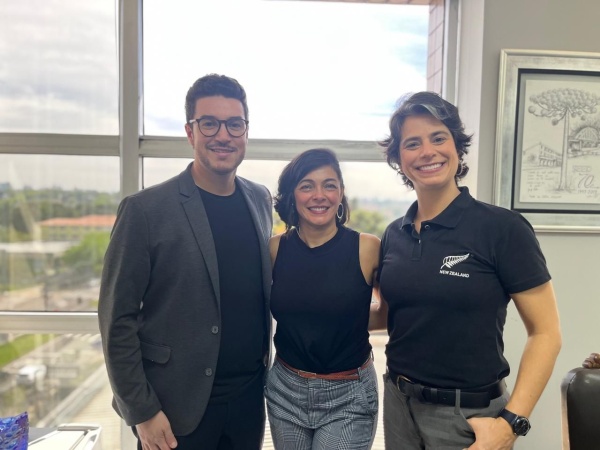
ENZ’s Bruna de Natale meets with ‘Ganhando o Mundo’ programme coordinators at the Paraná State Department of Education, Lucimar Gusmão and Marlon de Campos Mateus in October.
This was followed by a launch event hosted by the Paraná state government on 25 November in which the New Zealand Ambassador to Brazil, Richard Prendergast, attended alongside ENZ’s market development manager for Brazil, Bruna de Natale, state government officials, and hundreds of excited scholarship winners.
Ambassador Prendergast said that it was incredibly gratifying to participate in the Ganhando o Mundo programme launch event.,
New Zealand Ambassador to Brazil, Richard Prendergast, with Ganhando o Mundo scholarship recipients who will be heading to New Zealand in 2025.
“The two hundred students who will be going to New Zealand next year – and the 350 others who went in the two previous editions, in fact, all the Brazilians who studied in New Zealand, our alumni - are ‘informal ambassadors’ of New Zealand in Brazil,” said Ambassador Prendergast.
“They know and understand both countries and tend to work to expand our collaboration, to build bridges. People-to-people relationships are fundamental in our bilateral relationship, he added.”

Following the launch event, the Ambassador and Bruna de Natale, met with the Paraná state Secretary of Science, Technology and Higher Education, Aldo Bona, and the Secretary of Education Roni Miranda. They are pictured here with the Secretary of Education Roni Miranda.
Following the launch event, the Ambassador and Bruna de Natale, met with the Paraná state Secretary of Science, Technology and Higher Education, Aldo Bona, and the Secretary of Education Roni Miranda. They are pictured here with the Secretary of Education Roni Miranda.
ENZ’s Bruna de Natale said that this announcement is testament to the strong educational ties that are continually growing between New Zealand and not just the state of Paraná, but across the rest of Brazil too.
“A similar study abroad programme has also just been announced by the state government of São Paulo. ‘Prontos Pro Mundo’ (Ready for the World) will send approximately 100 Brazilian students to New Zealand high schools during term 1 next year,” said Bruna.
“We look forward to welcoming all of these Brazilian students to high schools and their local communities across the country in 2025 and building on this momentum to host more students in the future,” added Bruna.
1. Source: Ministry of Education interim international student enrolment data (January to August 2024).
-
Helping education agents understand the NCEA qualification and the pathways it opens to higher study
Education New Zealand and the New Zealand Qualifications Authority (NZQA) collaborated to organise a webinar for education agents in December on the National Certificates of Educational Achievement (NCEA), New Zealand’s school-leaver qualification.
The webinar was well received, with 241 attendees, and featured a robust question and answer session at the end.
The session helped education agents – and by extension the international students they support – in better understanding how NCEA works, the changes introduced to the qualification in recent years, and how learners can access higher education in New Zealand and internationally after achieving the NCEA qualification.
NZQA Deputy Chief Executive - Assessment, Jann Marshall, said the webinar was a valuable opportunity to build understanding of how the NCEA qualification works.
“It is important for everyone working with international secondary learners to have some understanding of how NCEA works, and the opportunities it creates for learners wanting to continue their study in New Zealand or internationally.
“It was great that we could engage with education agents on the topic and answer questions.”
NCEA is a well-recognised qualification in many countries. New Zealand is also a signatory to UNESCO qualifications recognition conventions (for example, Lisbon, Tokyo and Global Conventions), which support learners with NCEA to work or study internationally.
About NCEA
NCEA is offered at three levels – Level 1 is usually attempted by students in Year 11 of schooling, Level 2 at Year 12, and Level 3 at Year 13 (the final year of New Zealand secondary school). NCEA Level 2 is generally the minimum qualification needed for some jobs and tertiary education programmes, while Level 3, with the University Entrance award, is the minimum standard for entrance into a New Zealand university.
NCEA is standards-based, meaning each learner needs to show they have skills and knowledge at a specified level (a “standard”). Each standard a learner achieves gains them credits, and credits build toward an NCEA qualification.
Learners are also required to meet minimum requirements for literacy and numeracy. There are multiple opportunities in each school year for learners to attempt specific literacy and numeracy assessments, and there is also a list of other standards that can be used towards these requirements.
A recording of the webinar is available to view here on the Resources section of AgentLab
NCEA resources for education agents, students and parents
If you have any questions about NCEA, contact internationalunit@nzqa.govt.nz.
-
PM’s mission to Viet Nam marks significant progress in international education
Prime Minister Christopher Luxon’s recent trade mission to Viet Nam saw significant education outcomes delivered, including boosting the number of available Manaaki New Zealand Scholarship awards, increasing the number of the New Zealand Schools Scholarships (NZSS) to 45 places and introducing 14 New Zealand Universities Awards (NZUA) for the first time, as well as the announcements of several new partnerships between Vietnam and New Zealand education providers.
Education New Zealand Chief Executive, Amanda Malu, joined five providers for the education component of the trade mission - The University of Auckland, Auckland University of Technology, Media Design School, Pacific International Hotel Management School, and Neurofrog (edtech company).
The New Zealand-Vietnam EduConnect at Foreign Trade University was a significant education event in Hanoi, where Amanda joined Prime Minister Luxon in witnessing the signing of cooperation arrangements between education institutions in New Zealand and Viet Nam.
The EduConnect event also recognised the contribution of alumni to the friendship between our countries, with the launch of the inaugural New Zealand Alumni Network in Viet Nam.
ENZ Regional Director, Ben Burrowes said it was a wonderful opportunity to underscore the importance of people-to-people links in strengthening bilateral relations.
“This comes at an auspicious time, as New Zealand and Viet Nam celebrate the 50th anniversary of our longstanding partnership,” he added.
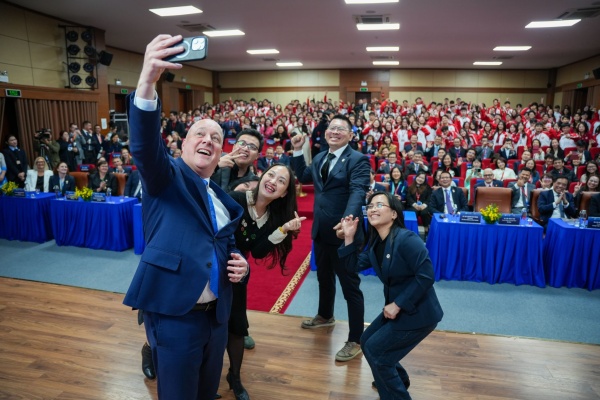
Prime Minister Christopher Luxon snaps some pictures with alumni at the New Zealand – Viet Nam EduConnect event.
AUT Vice-Chancellor Prof. Damon Salesa, Chair of Universities New Zealand's International Committee, represented Universities New Zealand to sign the Collaboration Arrangement with the Department of International Cooperation of the Vietnam Ministry of Education and Training.
The arrangement provides additional support to Project 89 scholars who wish to study in New Zealand. Project 89 is one of Viet Nam’s key initiatives to support its education sector, allowing local lecturers to pursue PhD study and postgraduate study overseas on fully-funded scholarships.
Following the success of education engagements during this trade mission, Amanda Malu, said New Zealand sees significant potential in strengthening education partnerships with Viet Nam.
“New Zealand will continue to expand the range of initiatives in Viet Nam across all levels of education, from schools to postgraduate study, to make it easier for Vietnamese students to engage in knowledge exchange, innovate and realise their dreams of studying abroad,”
“With Vietnam’s ambitious education and technology goals for 2045, our nation is well-positioned to support this journey,” she added. -
From the CE: Boosting global connections in education
Kia ora koutou,
In March, I spent an incredible couple of weeks in New Delhi and Mumbai as part of the Prime Minister’s Trade Mission to India, and for the 2025 Asia-Pacific Association for International Education (APAIE) conference.
During the trade mission, I was pleased to witness, together with Prime Ministers Christopher Luxon and Narendra Modi, the signing of a refreshed bilateral Education Cooperation Arrangement (ECA) between New Zealand and India. Education is a key feature in the New Zealand-India bilateral relationship, with India the second largest source market of international students for New Zealand.
The trade mission also served as a valuable opportunity to grow our connections with the Indian Institute of Technology New Delhi (IIT Delhi) through the New Zealand Centre, which is at the heart of our education partnerships in India.
IIT Delhi is backed by all eight New Zealand universities and is a hub for joint research and advancing India’s Digital India vision in AI, data science and advanced engineering. Prime Minister Luxon spoke at the education event which saw the announcement of several education initiatives, including a scholarship package and virtual internship programme, aimed at deepening bilateral collaboration.
There is no doubt that New Zealand has made a splash in India, and we look forward to continuing the momentum.
Last week, the Government announced its Quarter 2 Action Plan for New Zealand with 38 actions focused on economic growth. Boosting international education and export education earnings is a key action under the plan. ENZ is currently leading cross-agency work to develop an International Education Growth Plan for the Prime Minister and Ministers, and will be undertaking a series of sector engagements in the coming weeks.
It is an exciting time, and I look forward to sharing more about this work in my next column.
Ngā mihi nui,
Amanda Malu
Chief Executive
-
Successful agent engagement and student recruitment drive in Malaysia
The events aimed to gauge student interest in studying in New Zealand and deepen collaboration with education agents and schools.
To kick off the series, in early March, ENZ and representatives from New Zealand universities co-hosted a morning tea information session and focus group for Malaysian education agents in Kuala Lumpur.
The session promoted the ENZ resources available to support agents, and representatives from University of Auckland, University of Canterbury, Massey University, University of Otago, and University of Waikato led a discussion exploring key messages that resonate with Malaysian students and parents, understanding the factors influencing destination choice and brainstorming strategies to strengthen New Zealand’s brand visibility.
The event brought together 11 agencies from across Kuala Lumpur.
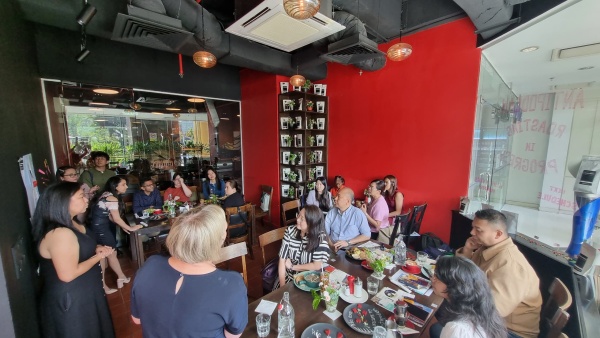
Co-funded agent activity
ENZ supported three key education agencies from across Malaysia to undertake co-funded student recruitment activity.
In Selangor, AECC Global Malaysia and ENZ hosted a mini-booth fair at HELP International School – giving students the opportunity to interact directly with representatives from Auckland University of Technology, the University of Auckland, the University of Canterbury, University of Otago, and the University of Waikato.
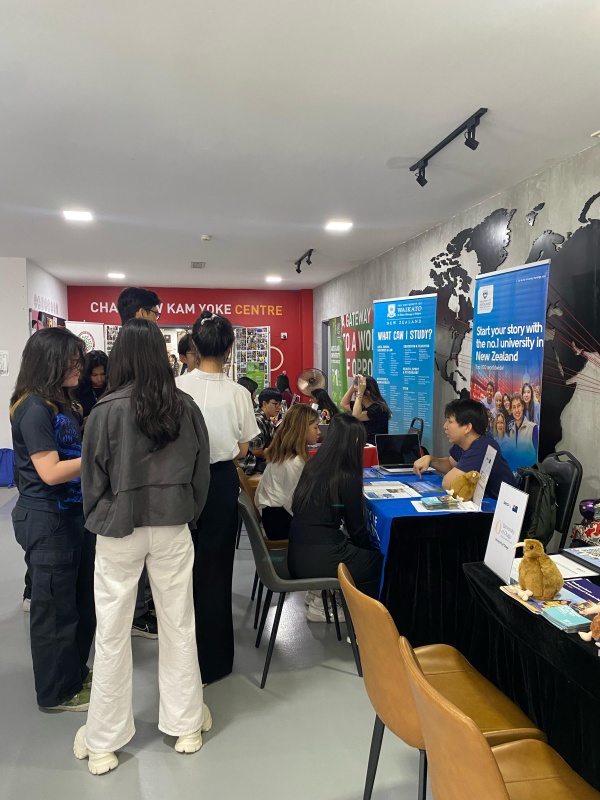
The mini-booth fair at HELP International School.
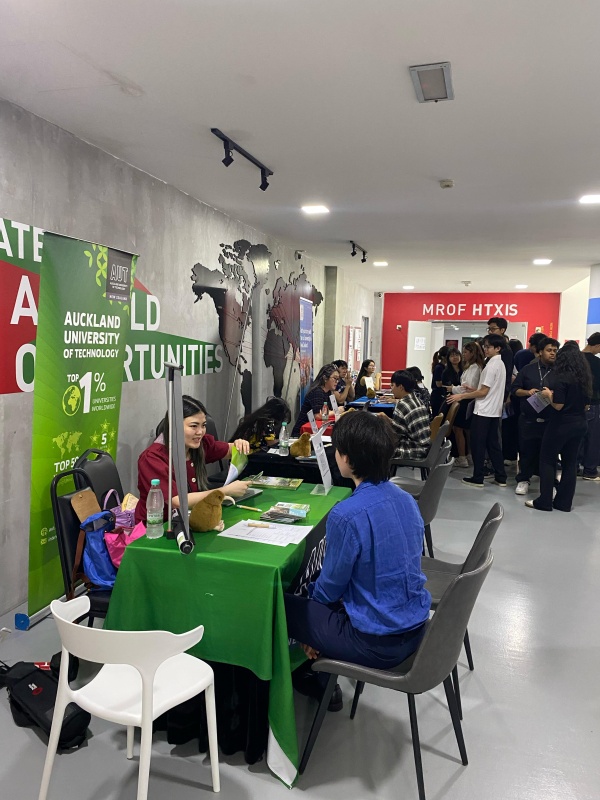
The mini-booth fair at HELP International School.
Over to Shah Alam, SELSET Education partnered with INTEC College to host an information session showcasing eight of New Zealand’s tertiary institutions.
INTEC College students heard from the Auckland University of Technology, the University of Auckland, University of Canterbury, University of Otago, University of Waikato, Southern Institute of Technology, Nelson Marlborough Institute of Technology and pathway provider, University of Canterbury International College.
Around 100 students were in attendance, and the session was followed by an opportunity for students to chat further with the study providers on show.
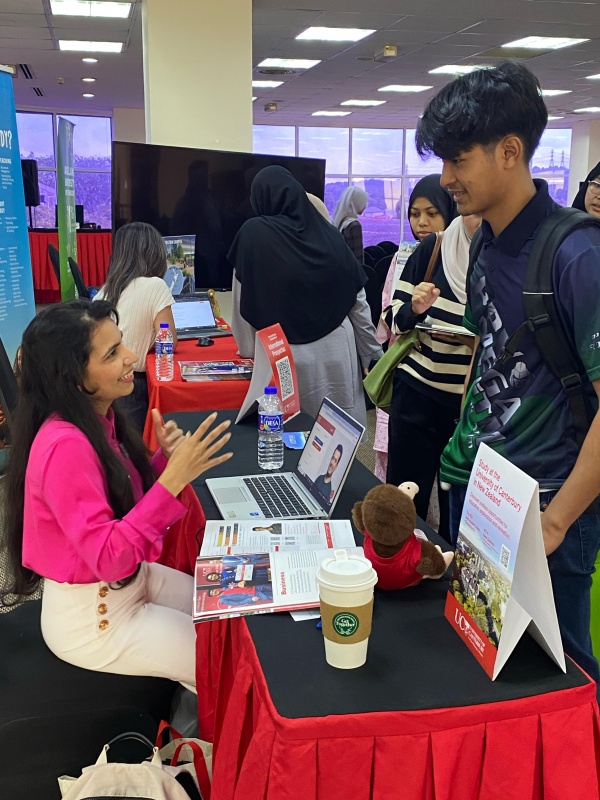
Students at INTEC College exploring New Zealand tertiary education study options.
To close out the co-funded activity, ENZ made its first official visit to East Malaysia since before the pandemic.
ENZ and JM Education partnered to lead a series of school visits in late April Kota Kinabalu, Sabah.
Around 400 students attended information sessions across three schools. The events were led by the University of Auckland and University of Otago at Kota Kinabalu High School, Sekolah Menengah Sains Sabah, and Maktab Nasional.
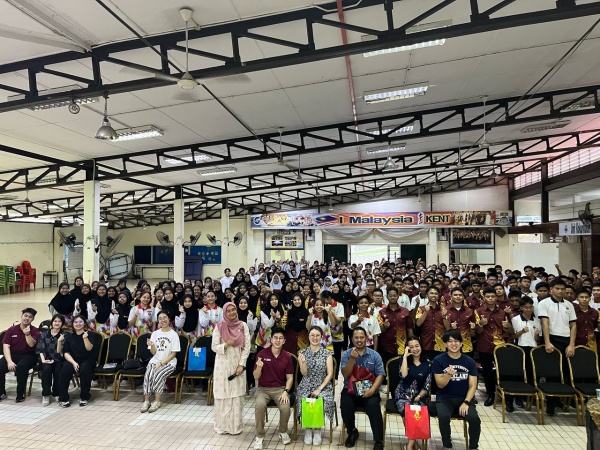
Attendees of one of the information sessions.
ENZ Market Manager for Indonesia and Malaysia, Naluri Bella, said that partnering with agents for co-funding targeted activities helps enhance both agents and students’ awareness and understanding of New Zealand’s unique education offering.
“These collaborations not only build trust and commitment among agents but also positions New Zealand as a competitive and credible choice for Malaysian students,” she said.
-
New Zealand institutions strengthen ties with Latin American education agencies
In April, ENZ supported the Study in New Zealand Agent Seminars – an event series organised by Kiwi EdLink, a New Zealand-based organisation that represents education providers across the country.
New Zealand’s educations offerings for Latin American students were showcased to education agents at the seminars. From English language programmes for children, youth, and adults to short or long-term school studies in New Zealand.
The participating institutions from New Zealand were the Kiwi English Academy, Glendowie College and Onslow College.
ENZ teams in Santiago and São Paulo hosted networking events at the New Zealand Embassy in Chile and the Consulate in Brazil, inviting selected agents aligned with Kiwi EdLink’s strategic goals in the region.
In addition to facilitating these connections, the ENZ team also provided market insights and engaged in conversations about future steps to deepen engagement and opportunities in Latin America’s dynamic education landscape.
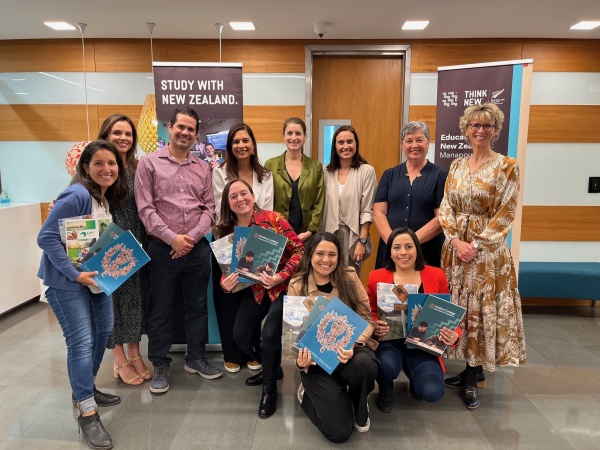
Attendees of the Study in New Zealand seminar in Santiago, Chile. This event was hosted at the New Zealand Embassy.
During the event in São Paulo, Director of Kiwi English Academy, Kathryn Herbert, said “This is a moment to reconnect with our Latin American partners so we can better understand how to offer relevant programs to Brazilian students.”
The feedback from sector attendees was positive. Director of International Students at Onslow College, Robynne Bloemstein, said that the institution is very excited to reengage with the Latin American market and welcome students from the region into its student body, which already includes 45 international students.
It was the first visit to Brazil for the Director of International Students at Glendowie College, Rebecca Johnstone. She said “We love Latin American students—we currently have 47 international students in total, including two Chilean students and a new Brazilian student starting in July. They all contribute greatly to the multicultural environment of our school.”
Check out the video report the ENZ team put together with the representatives of New Zealand schools at the São Paulo event.
-
Aotearoa sharpens Sherpa’s ambitions on conservation in Nepal
The Everest region of Nepal is his home, and he has seen first-hand the impact of climbers and climate change on the world’s most famous mountain environment.
The former international student to New Zealand is a columnist in the Kathmandu Post, readily highlighting successes and calling out failures on a range of environmental issues impacting Nepal. He is part of a generation determined to find solutions.
Tsewang recently completed his Master’s in Environmental Management at Lincoln University, an international education experience made possible by the Mingma Norbu Sherpa Memorial Scholarship. Mingma was an early graduate of Sir Edmund Hillary’s Khumjung School, an alumnus of Lincoln University, and one of the leading voices on conservation in Nepal and Bhutan through his work with World Wildlife Fund (WWF) before his untimely death in 2006.
His legacy is a scholarship jointly funded by WWF, Lincoln University, and the Greater Himalayas Foundation which supports students from remote regions of Nepal committed to careers in conservation to study at Lincoln.
Tsewang says the links with New Zealand which date back to the work of Sir Edmund Hillary, and his belief in the importance of education for future generations, are a driver for many Nepalese students seeking to improve their opportunities in life.
“The connection is very strong,” he says. “Sir Ed Hillary is such an icon and I feel that the students who come to New Zealand to study are continuing to strengthen the relationship established by Sir Ed and Mingma”.
Fulfilling the dream of a New Zealand education
“The scholarship allows you to fulfil a vision of having a higher education in New Zealand, but more than that, it connects many people already working in the conservation sector in New Zealand, Nepal, and other parts of the world.”
Tsewang spent two years in New Zealand, arriving just before the border closed in 2020 and is grateful that his studies were largely unaffected by the pandemic. He says he has learned much about New Zealand’s approach to conservation and gained a better understanding of te ao Māori and the concept of kaitiakitanga (guardianship and protection).
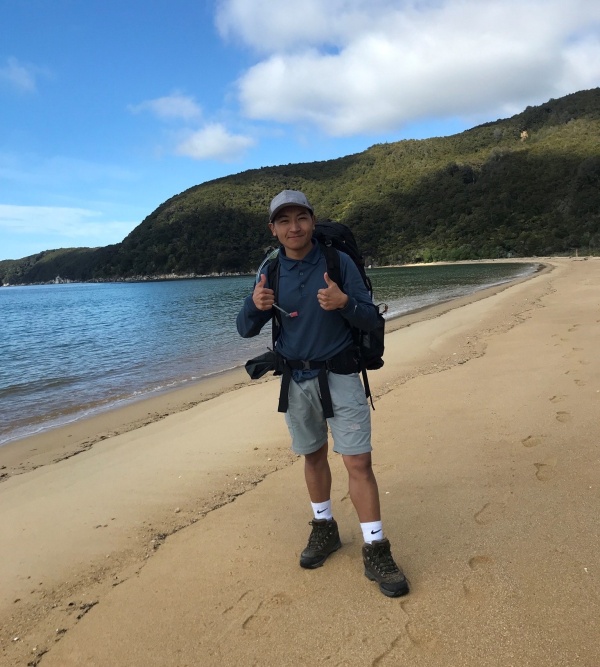
“I am a Sherpa. We are renowned as mountaineers, but we are also an ethnic tribe with a strong connection and respect for nature and a strong desire for environmental stewardship.
“Seeing Māori taking ownership of preserving and retaining their culture was an important learning for me. These are taonga (treasures) which we should be taking from one generation to another.
“Through my education I want to promote empowerment of local people on conservation issues,” Tsewang says. “Studying in New Zealand made me realise that this is already happening in Nepal, but we just need to find ways to make it more effective.”
Tsewang’s Master’s research was into the effectiveness of the Garbage Deposit Scheme (GDS) initiated by the Sherpa people, in which Everest climbers pay a US$4000 deposit that’s returned only if they bring back at least 8kg of rubbish produced during their expeditions. “Working in conjunction with the aims, aspirations, and opportunities of local communities is incredibly empowering.”
Making a positive impact in Nepal
The students who have come to Aotearoa have made a positive impact in Nepal, Tsewang says. “It’s all about learning from best practice and sharing knowledge.
As one person it’s hard to make change, but by sharing information and knowledge we can make incremental change.”
“We are seeing that governments globally are starting to overhaul their environmental protection policies. New Zealand has played a key role in the context of Nepal because people before me came to study and returned home to build crucial environmental education and awareness.”
Tsewang loved his time in Aotearoa, both inside and outside the classroom, having spent most of his free time hiking iconic tracks. “There’s so much learning that happens out in the field where you hear first-hand of the experiences of those working in conservation.
“This was an essential part of my education experience. You have unplanned conversations which are inspiring and hugely valuable,” he says.
“The last two years have been monumental in so many ways. It’s not just the academic learning, but also the personal growth. I have gained so much confidence to voice my opinion and share my knowledge.
“I will stay in touch with many of the people I have met and hopefully we will have the opportunity to collaborate in the future. Learning never stops.
“The international education opportunities with New Zealand only serve to strengthen the long-standing bond with Nepal. There’s a real legacy involved for both countries.”
-
BizVenture winners tackle youth mental health with "It's Okay" clothing range
The innovative business entrepreneurship scheme is a pilot initiative led by Education New Zealand, Young Enterprise Scheme (YES), and Japanese partners to give students in both countries real-life experience in developing business solutions that address one of the United Nation’s 17 Sustainable Development Goals.
Forty students collaborated in a three-day virtual exchange, where they chose a challenge tackling some of Japan’s pressing social issues, before designing and presenting a business plan in a “Dragon’s Den” style pitch to judges.
The winning New Zealand team - Hamish Robinson (Taradale High School, Napier), Benjamin Young (Tauranga Boys’ College), Daniel Blight (Waimea College, Napier), Kaiah Sherriff (Southland Girls’ High School), and Abirami Kabilan (Pakuranga College, Auckland) - chose to come up with a strategy which would directly enhance the mental wellbeing of Japanese teenagers.
The UN SDGs are some of the biggest problems facing humanity today, so working on them was a pretty full-on task” – Pakuranga College student Abirami Kabilan
It is a topic which directly impacts young people in both countries, as UNICEF ranks Japan 37th among 41 OECD countries for the state of children’s mental health, and New Zealand one lower, at 38th place.
Insights into business and culture “eye-opening”
To succeed, the students had to gain a thorough insight into Japanese culture, youth behaviour, and business practice. Ahead of their pitches, the teams joined interactive workshops with New Zealand and Japanese guest speakers, cultural mentors, and language coaches.
Abirami Kabilan describes the exposure to Japanese business and societal culture as “eye-opening”.
“The UN SDGs are some of the biggest problems facing humanity today, so working on them was a pretty full-on task.”
“One of the most interesting things about this cross-cultural experience was seeing how the Japanese students approached the same problems. Young people around the world will have such different ways of approaching these problems too. Imagine the ideas we would come up with if we all worked together.”
The winning team successfully pitched a clothing brand called 大丈夫, which translates in English to “It’s Okay”, to get the conversation about mental health out in the open among Japanese youth, and hopefully gain the support of high-reach Japanese influencers to help push their critical wellbeing message.
They decided the best way to break into the Japanese market would be with “in your face” messaging using symbols of strength, such as dragons and samurai, to promote their message.
“This is something that has not been done in Japan before and we’re ecstatic to be winners,” Hamish Robinson says.
BizVenture promotes global competency
The BizVenture programme will allow students to understand the Japanese business context and increase their global competency, says Young Enterprise Scheme lead Elizabeth Pittman.
“New Zealand youth have such a strong interest in sustainability and improving social outcomes within their communities and abroad, and this challenge allows them to explore that interest in a business context.”
International education adapts to changing needs of learners
Education New Zealand is keen to build on the success of this year’s pilot BizVenture programme as international education adapts to meet the changing needs of learners. International research shows that students are increasingly seeking programmes and content that is relevant to real world problems and which will allow them to make a real difference.
The programme also builds on New Zealand’s diplomatic relationship with Japan while travel for international students remains limited.
“Over many decades Japan and New Zealand have benefitted from an enduring partnership,” says Hamish Cooper, New Zealand Ambassador to Japan. “Education has played a really important role in fostering people-to-people ties, and supporting the development of what are now, in 2021, very close connections between our two countries.”
“Before the pandemic, more than 10,000 students from Japan studied in New Zealand every year, making an important economic contribution, but also enriching our schools and communities, and helping New Zealand students become more globally connected.”
-
Fermented flour a food waste breakthrough
Ninna Granucci, a former University of Auckland international student, is part of a new generation of thinkers contributing solutions with out-of-the-box thinking.
Ninna grew up in Brazil and saw for herself the amount of food waste primary producers there generated. Learning about the scale of the problem globally, she resolved to apply her skills to help bring about change.
“I wanted to use science in an area which fascinates me –microbiology and specifically, fermentation – to try and find a solution to this huge problem.”
University of Auckland a great place for new ideas
Ninna chose to study for her PhD in Biological Sciences under Dr Silas Villas-Boas at the University of Auckland in 2014. “The university environment was a great place for new ideas, to promote the spark to find solutions to problems, with the scientific approach to support it.”
It clearly worked. After only 18 months, she had a breakthrough in the lab which she knew could make a real difference. She refined a fermentation process to successfully convert waste pulp and peel from selected fruit and vegetables into a nutritious flour. Widening the range of ingredients in her trial, she proved she was on to something.
Data from the UN’s Food and Agriculture Organisation (FAO)shows that almost 32 percent of plant-based product is wasted annually. Ninna’s technology has the potential to make substantial progress on this.
It turned out that the ingredients also tick all the boxes for health and sustainability-conscious consumers: high protein, high fibre, low calorie, gluten free, rich in vitamins, minerals and natural antioxidants. And the bonus is that they also have lowest CO2 footprint compared with other ingredients in the market today.
Entering her prototype into the University’s Velocity 100K Business Idea Challenge sparked media interest and a flurry of inquiries from supermarkets and other businesses wanting to buy the product. “That was when we realised it was not only an academic project but also something which could be much bigger and could help to address the problem of food waste,” Ninna says.
Green Spot Technologies has global plans
With support from Velocity, she and Silas co-founded sustainable food innovation company Green Spot Technologies, which has ambitious plans to go global. Ninna is now CEO and based in Toulouse, France, where the business is established in a start-up accelerator environment and employs 15 people.
But back in the early days, it was pretty nerve-wracking. “My plan was to complete my PhD first and then set up a company based around the project. But after the success in the Velocity Challenge, we decided the time was right to forge ahead with the start-up. It was quite challenging. My background is all scientific, I didn’t have any experience in business, and I had a lot to learn.”
She is grateful for the support she got at the University of Auckland and believes that her career path would never have progressed as quickly if she hadn’t chosen New Zealand as a study destination.
“I give a lot of credit to New Zealand for how things worked out”
“New Zealand was the catalyst,” she says. “I managed to secure a scholarship through Callaghan Innovation available to students looking to add value to waste streams. It allowed me to focus on the work and find opportunity. I give a lot of credit to New Zealand for how things worked out.”
Ninna worked in Auckland with other international students from around the world and says that, too, helped contribute to her success. “When you are in the same situation you can support each other and that was super important during my PhD.”
New Zealand education the right decision
Ninna remains passionate about sustainability and reducing food waste. It is at the heart of her business and is important to her personally. The mission of Green Spot Technologies is “challenging the food waste paradigm to feed the future”. The company has won multiple awards, both in New Zealand and in Europe, highlighting the unique nature of its technology and products.
With food insecurity spreading to hundreds of millions of people around the world, the UN has set a Sustainable Development Goal (SDG) to halve food waste by 2030. It is an ambitious target and needs innovative thinkers like Ninna to make it achievable.
“I think it is incredible that we waste so much food, knowing that we need more food in the world. It doesn’t make any sense, but it motivates me to work on solutions,” she says.
The decision to study in New Zealand was a critical part of Ninna’s journey from international student to international businesswoman and innovator. “I could not have imagined that it would lead to such huge changes in my life in such a short time,” she says.
“A New Zealand education provides a truly enriching experience. I really think I made the right decision.”

